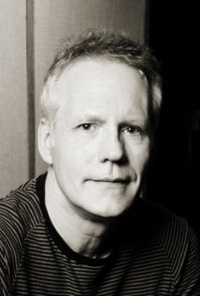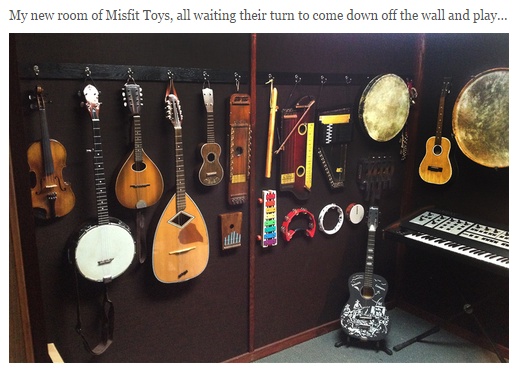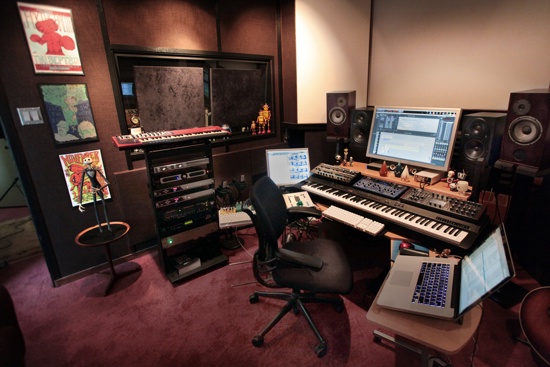Artist interview: Rod Abernethy
Artist interview: Rod Abernethy
 Intro (source: IMDb)
Intro (source: IMDb)
Award-winning composer and musician Rod Abernethy crafts authentic and memorable music scores for visual media including video games, advertising and television. His rich musical repertoire encompasses traditional acoustic and ethnic scores, unique hybrid soundtracks fusing electronic and organic elements, as well as dramatic music written for orchestra and choir.
Rod's dynamic music productions enhance numerous high profile video games such as Dead Space, RAGE, TOME, Pacific Rim, Alpha Protocol, TERA, Eat Lead, Ben 10, Dead Head Fred, and The Hobbit as well as promotional trailers for Darksiders, Warhawk, Lineage II and Prince of Persia. Rod's music has also been featured in programming for major networks including ABC, CBS, Discovery Channel, ESPN, Fox, G4, HBO, Nickelodeon, TLC and PBS.
As a signed artist he has recorded in major studios around the world for record industry giants Warner Bros., Elektra, Atlantic, and MCA Records and collaborated with legendary producers Paul Rothchild (The Doors, Bonnie Raitt), John Anthony (Roxy Music, Queen) and David Lord (Peter Gabriel, Tori Amos, Tears for Fears, The Pretenders).
SampleSumo: As with all artist interviews we do at SampleSumo, we like to start with some background info: how did you first get in contact with music, and perhaps more importantly: what influenced you into the direction of actively creating music yourself?
Rod: I started composing in high school, writing songs on guitar and piano. My first big influences were wide and varied, from Hendrix to Chopin to John Williams and I spent a lot of time playing guitar. After getting a degree in music from UNC-Chapel Hill in the U.S., I played in rock bands with major label record deals and toured the U.S. and Europe, it was an incredible time in my life. After life on the road, I opened my own recording studio and began scoring for television, films, commercials and video games. I've been very fortunate working in film and TV and worked on over seventy video games.
SampleSumo: How did you perceive the music education process when you went through it? Do you believe there are areas where new kinds of tools could help more people get into music playing (or even music creation)? Any ideas you might have for music technologists?
Rod: Well, you know the music education process never stops, it's an ongoing process:) That's why I love music so much, it's a continuous exploration. I'm glad now that I went to school and got a formal education, it's been a good foundation that I rely on daily. The funny thing is at the time I didn't really want to go to school. I just wanted to play in bands but my parents helped steer me toward getting a degree and I'll always be grateful for that.
I think the best advice I could offer about getting into music and finding the right kind of tools is discover what styles you're really good at. Explore those styles in depth, backwards and forwards…eat, drink and sleep what you're good at. When you discover your own best talents and worst faults, you can keep building on your music foundations into other styles and arenas of music.
SampleSumo: If you would have to pick your 3 most favorite music instruments (including electronic ones) which would these be and why?
Rod: Guitar, acoustic piano and my DAW. I consider my computer a musical instrument, that may sound weird but I treat it as one :)
SampleSumo: Looking through your Twitter en Tumblr posts, this one from December last year sparked my attention: "My new room of Misfit Toys, all waiting their turn to come down off the wall and play..." Could you explain what this was about? Do you play all of these?

Rod: You found my little sound closet of toys :) Yes, I play them all depending on what projects I'm working on. On my album "The Upward Turn", I used most of them in different ways, sampling and manipulating the samples in many plug-ins, especially SaltyGrain. I have more stuff in another storage room, I tend to collect a lot of junk along the way but you never know what you'll end up using on a track.
SampleSumo: You've worked in television, film and on lots of video games. I'm always curious to hear how composers perceive these different domains from their creative point of view. Do you see big differences in your way of working in each of these domains?
Rod: No matter what I'm working on, I usually have the same process of composing.
Any composition starts with coffee in hand. I begin by laying out a particular sound palette that I feel fits the style I'm composing in, then I might listen to guide tracks in that style to get in the right frame of mind. Next, I try to clear my mind and sit in front of the computer screen with my head in my hands and wait for the muse to wake up and take over…it usually does.
SampleSumo: So, at some point, a game development studio contacts you to create a score for a new video game. How does this usually go: do they give you just a raw explanation of the gameplay and levels, or do you get very early alpha versions of the game to play with to feel the environment, or nothing of all that? How is the game music creation process usually?
Rod: All of the above. There's no one standard way to start a game score. Sometimes I get to play the game before I score it and other times I don't play it until the game is finished. The most important role of a game composer is to be a team player with the developer and help them make the best game possible. It's good to be flexible and be patient with the game development process, it always pays off.
Many games these days require that the composer submit a demo. The developer gives you an explanation of the game in very basic terms along with guide tracks of what styles they're looking for. They also give you plot outlines, artwork and possibly a video of gameplay.
I've always said that it takes a great audio director to produce a great game score…he or she is driving the bus. The best audio directors will give you great direction but also allow you the freedom to explore and be creative with your own ideas.
SampleSumo: I noticed this post from some time ago, regarding live orchestra recordings in Hungary: "Live in Budapest for my new album "Dark Evolutions" for West One Music"
Do you get to be there during the recording and still change things on the spot? Or is your role more that of a remote supervisor at that point? Working with that many people must be totally different than composing in your studio?
Rod: For the Budapest sessions, I decided not to go to the sessions and handle it remotely, only because I had Bill Conner orchestrating and conducting the sessions for me. He's in the UK, and a fantastic orchestrator. I love working with orchestras and most of the time I attend the recording sessions…some of my favorites have been at Skywalker Sound with the Skywalker Symphony Orchestra and the Bastyr Chapel in Seattle with the Northwest Synfonia.
SampleSumo: What would be your 2 most interesting projects you've worked on in your music career, and why?
Rod: That's a very hard call to narrow down just two. For video games it would be working on RAGE for id software and Dead Space for Electronic Arts. RAGE was a compositional dream for me, I was given license to explore and create some of my best compositions that I've done for games. Dead Space was an incredible opportunity to record live orchestra at Skywalker Sound and explore abstract and aleatoric orchestral ideas, it was a great learning experience for me.

SampleSumo: You're using SampleSumo's SaltyGrain (our granular audio effect plugin) in your work. Are there certain types of sound design techniques / tools that you prefer more than others, and if so, any particular reason why?
Rod: I use so many different techniques, some of them are ancient and basic and some new and experimental. But I wouldn't say that I'm creating any new techniques that aren't already being used by others. There are so many incredibly talented composers and recording artists now that are technical wizards. One method I've explored a lot is with SaltyGrain, putting acoustic guitar phrases into it and mutating the hell out of them. I find SaltyGrain gives a lot of instant gratification when you're experimenting with it…but you better have the red light on and recording while you're mangling stuff with it in case you miss a move that's not easy to do over again. I'm always recording live when experimenting with apps and plug-ins, then I go back and edit my tracks to suite my needs.
SampleSumo: We've seen a lot of things move from pure analogue to digital / software-based over these last decades. How do you personally see music creation and production tools evolve over the coming years? Are there specific things you would like someone to build, or things you feel can still be improved?
Rod: There's so much out there now, honestly it's overwhelming sometimes. A lot of the virtual instrument market gets a bit redundant and it takes a lot of thought into making something that's really special these days. I see the analogue modular scene growing more and more...fans of modular are very loyal to their craft and for good reason.
I think we'll see more depth into granular synthesis and live performance with virtual synthesis. We're going to see more and more synthesis being done on portable devices…iPad, iPhone, etc. But don't sell that old mono synth that's in your closet...you're going want it back someday soon. It's where it all began.
SampleSumo: Can you tell us what project you're currently working on?
Rod: I'm performing live a lot these days. I just finished composing for a great online MOBA game called TOME by Kixeye. I'm also working a two new albums, one involving a lot of acoustic guitar. Life is good :)
SampleSumo: Thanks for talking to us!
Rod: Sure thing, thanks for the interview and keep making great music software!
More info on Rod and his work:
YouTube channel
IMDb page
Wikipedia page
